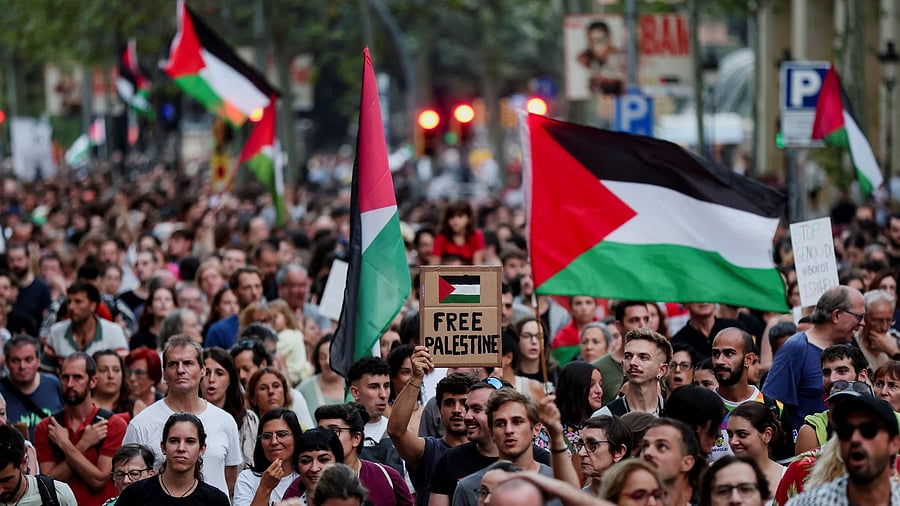
A demonstrator holds up a sign reading "Free Palestine" during a protest in support of Palestinians, in Barcelona, Spain on September 18.
Credit: Reuters photo
In a move that is being widely seen as a mere ‘symbolic gesture’, the United Kingdom, Canada and Australia have officially recognised a Palestinian state. More countries are expected to follow suit at the United Nations General Assembly debate in New York this week. Now, the question arises: what does this official recognition mean for the Palestinian people, who continue to live under occupation and Israeli bombardment? Will there be a change to this reality? Or is it just a symbolic gesture after all?
A decades-long demand
For starters, this is not the first time that the idea of a Palestinian state has been spoken about. It has been at the heart of international diplomacy for decades. In 1947, the United Nations voted for a two-state solution, partitioning Palestine into a Jewish state (Israel) and an Arab state (Palestine). Israel declared independence the next year, but the Arab state never came into being.
After Israel declared independence, a war erupted with its Arab neighbours that very year, and more than half of the Palestinian population was forced to leave. In 1967, following the Six-Day War, Israel took control of the West Bank, East Jerusalem and Gaza — the areas which Palestinians want as their independent land.
For years, negotiations circled around this idea. In 1988, the Palestine Liberation Organisation (PLO) declared independence, and most countries in the Global South, including India, as well as nations in Africa and Latin America, supported and recognised this. Currently, over 145 of the 193 UN member states already recognise the statehood of Palestine.
However, the problem remained unresolved because Western powers held back recognition, insisting that it should only come after Israel and the Palestinians negotiated a two-state solution. But as a Reuters report points out, such talks have been frozen since 2014, and Israel’s Prime Minister Benjamin Netanyahu has openly declared that a Palestinian state will “never” exist.
This is where the latest announcements by the UK, Australia and Canada, all of whom are close allies of the United States become significant.
For Palestinians, recognition is about dignity as much as diplomacy. “It matters because these countries broke ranks,” Rida Abu Rass, a Palestinian political scientist, told Al Jazeera. “Israel finds itself further isolated, and I think that’s meaningful,” he adds.
But the fact of the matter is that recognition alone is not enough to change the ground realities.
At the UN, Palestine still only has an observer status, which means it cannot vote. Full UN membership would require Security Council approval - something the United States can block with its veto.
The Palestinian Authority (PA), led by Mahmoud Abbas, governs only parts of the West Bank under agreements with Israel. Gaza, meanwhile, has been controlled by Hamas since 2007. Israel still controls Palestinian borders, airspace, and trade. There are no Palestinian airports, and even movement between Palestinian areas depends on Israeli checkpoints.
According to a report by DW, recognition “doesn’t change anything immediately but it gives the Palestinians a much higher stake in negotiations,” since talks would then take place between recognised states rather than between a state and an entity.
Why now?
Israel’s ongoing assault on Gaza has killed over 65,000 people according to Gaza’s health ministry, though independent researchers believe the toll is even higher. A UN inquiry last week concluded that Israel is committing genocide - a finding which has been rejected by Israel and its ally, the US.
Faced with mounting public anger and domestic political pressure, especially among centre-left governments, some Western states are acting. French President Emmanuel Macron was among the first major leaders to endorse recognition, calling it a step that must go hand in hand with Palestinian governance reforms.
Analysts told Al Jazeera the move is also a way to punish Israel diplomatically for its conduct in Gaza and the West Bank, while still avoiding harsher measures like arms embargoes or sanctions.
Israel’s and America’s pushback
Israel has condemned the recognitions as a “reward for terror,” arguing that they legitimise Hamas after the October 7, 2023, attacks that killed about 1,200 people in Israel. Netanyahu has flatly rejected the idea of Palestinian sovereignty, saying, “A Palestinian state will not be established west of the Jordan River.”
The US, too, opposes recognition at this stage. Washington has even imposed sanctions on Palestinian officials and blocked some from attending the UN General Assembly by revoking visas.
More than “empty gestures”?
Critics argue recognition risks being hollow if it isn’t paired with concrete action. Israeli columnist Gideon Levy wrote in Haaretz that “recognition is hollow lip service” unless followed by boycotts, sanctions or measures to hold Israel accountable for alleged war crimes.
Palestinian voices echo this concern. Ines Abdel Razek of the Palestine Institute for Public Diplomacy wrote that Western states often “embrace symbolic gestures, while Palestinians are left with neither justice nor statehood.”
But symbolism still has weight. Hugh Lovatt of the European Council on Foreign Relations told DW that recognition is “an important reaffirmation of Palestinian rights and self-determination.” It also forces recognising countries to review their legal and diplomatic ties with both Palestine and Israel — whether in trade, consular presence, or future negotiations.
The road ahead
Recognition will not stop the war in Gaza or dismantle Israel’s occupation overnight. But it shifts the diplomatic ground. As Omar Auf, an Egyptian political analyst, noted in The Cairo Review, past attempts by Palestinians to join treaties like the Geneva Conventions were blocked because their statehood was in question. Formal recognition could strengthen their standing in international law and institutions.
For now, it remains a symbolic but powerful step. As more countries line up to recognise Palestine, the question is whether that symbolism will be backed by the kind of political and economic pressure that could change realities on the ground.